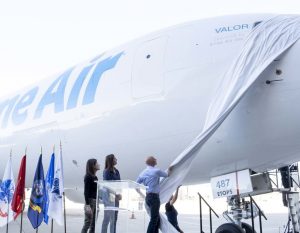No products in the cart.
Amazon tacitly admits in 10-K that integrators are now competitors
 As Amazon continues its meteoric rise into the e-commerce stratosphere, the company’s relationship with the well-established integrators, like FedEx, UPS and DHL, have been relatively cordial, as Amazon has long relied on the express companies’ vast networks of last-mile options to deliver goods in a timely fashion.
As Amazon continues its meteoric rise into the e-commerce stratosphere, the company’s relationship with the well-established integrators, like FedEx, UPS and DHL, have been relatively cordial, as Amazon has long relied on the express companies’ vast networks of last-mile options to deliver goods in a timely fashion.
However, according to the latest annual Form 10-K statement filed with the Securities and Exchange Commission (SEC), there has been a subtle, but crucial, addition in Amazon’s description of its competitors that may give pause to the likes of FedEx and UPS. Under the section titled “Risk Factors,” Amazon describes how it faces “intense competition” from a long list of entities. This year, for the first time, the company includes “transportation and logistics services” on the list, suggesting that Amazon will be focusing more of its attention on supply chain logistics this year.
“Our businesses are rapidly evolving and intensely competitive,” the SEC filing reads, “and we have many competitors in different industries, including physical, e-commerce, and omnichannel retail, e-commerce services, digital content and electronic devices, web and infrastructure computing services, and transportation and logistics services, and across geographies, including cross-border competition.” In the 10-K statement for 2017, the wording is identical except for the addition of “transportation and logistics services.”
For the last decade, as both integrators and, later, Amazon grew to control a larger percentage of the e-commerce express market, they officially declared themselves equal partners, along with the U.S. Postal Service, in delivering packages to their clients as quickly as possible.
 In 2015, when FedEx Corp.’s David Bronczek and Fred Smith were named airfreight’s Co-Executives of the Year by Air Cargo World, Bronczek conceded that “there’s some competition” with Amazon, but insisted that the Seattle-based e-tailer was still a “partner,” much like the U.S. Postal Service. “We partner with them, and at the same time, we compete in some sectors with them,” he said. As recently as December 2018, Air Cargo World’s current Executive of the Year – Sarah Rhoads, head of Amazon Air – said FedEx and UPS “are still very much our partners” in Amazon’s quest to meet its “two-day [delivery] promise.”
In 2015, when FedEx Corp.’s David Bronczek and Fred Smith were named airfreight’s Co-Executives of the Year by Air Cargo World, Bronczek conceded that “there’s some competition” with Amazon, but insisted that the Seattle-based e-tailer was still a “partner,” much like the U.S. Postal Service. “We partner with them, and at the same time, we compete in some sectors with them,” he said. As recently as December 2018, Air Cargo World’s current Executive of the Year – Sarah Rhoads, head of Amazon Air – said FedEx and UPS “are still very much our partners” in Amazon’s quest to meet its “two-day [delivery] promise.”
Today, it would be hard to deny that this alleged partnership has become strained, at the very least. “Some of our current and potential competitors have greater resources, longer histories, more customers, and/or greater brand recognition, particularly with our newly-launched products and services and in our newer geographic regions,” the Amazon 10-K statement continued. “They may secure better terms from vendors, adopt more aggressive pricing, and devote more resources to technology, infrastructure, fulfillment and marketing.”

Amazon still relies heavily on integrators to handle the vast demand for express e-commerce airfreight, but it has taken steps to gain greater control of its air network in recently years. Late last year, Amazon accepted the last of the forty 767 freighters it had ordered in 2016 to be operated on an CMI (crew, maintenance and insurance) basis by Atlas Air Worldwide Holdings (AAWW), and by Air Transport Services Group (ATSG) subsidiary carriers, ATI International and ABX Air. In December, Amazon Air said it was increasing the size of its fleet by at least 10 more 767-300Fs from ATSG, and our sister publication, Cargo Facts, said it is likely that Amazon Air may want to secure even more dedicated freighters later this year.
In early 2018, Amazon began offering a new logistics service called “Shipping With Amazon,” which made it a more direct competitor with the likes of FedEx and UPS, and also began offering major discounts for customers using their fulfillment services. Not to be outdone, FedEx just last month began offering a late-night shipping option for retailers to make it easier to compete with Amazon’s e-commerce capabilities.
While neither Amazon nor any of the integrators has changed their official stance on their collaboration in the e-commerce market, the stage has been set in 2019 for a potential showdown in this volatile and rapidly growing market. Stay tuned.
















